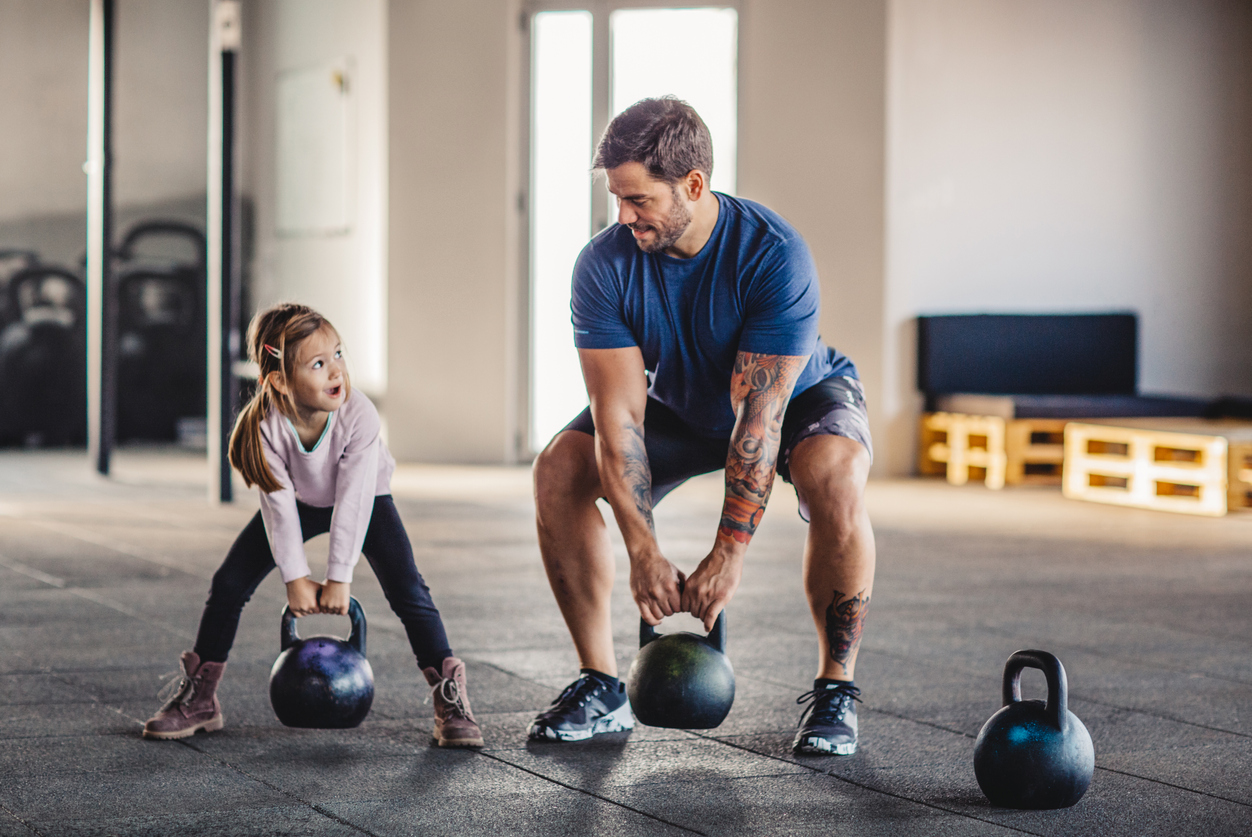Will My Child Be Athletic? A Genetic Explanation

Do you dream of your child being a future professional athlete, Olympian or high-school sports star?
Watching your kids grow up comes with the joy of seeing their skills and abilities (or lack thereof) develop over time.
If you are athletically inclined, it’s quite possible your child will also be an athlete, too.
But is athletic ability in the genes? Or just part of your family’s lifestyle? There’s more to your child's future fitness than you’d think!
Related: How Tall Will My Baby Be? (A Genetic Explanation for Height)
What Does Being Athletic Mean?
It is important to remember that just like there is not one type of athlete, there is not one type of athleticism. Athleticism is formed by several key traits including strength, speed, power, cardiovascular fitness, flexibility, and coordination.
Most good athletes will score reasonably highly in all of these fundamentals but a particular sport will require different levels of each one. For example, a soccer player will need to have very high cardiovascular fitness in order to use oxygen efficiently and supply the muscles during a long match. This isn't so important to an archer, but hand-eye coordination is.
Body type is also important when it comes to success or failure in a certain sport. Having the right physique for the right sport is a great starting point to success.
We know that being tall is important if you want to be a professional basketball player but you won’t make it unless you have access to decent equipment, tactical sense, and the motivation to practice.
Is Athleticism in the Genes?

The traits needed to be a good athlete, like strength and speed, have a strong genetic basis. Studies focusing on similarities and differences in athletic performance between family members, including twins, show that genes account for around 30-80% of these differences.
According to a study published in June 2016, from 1997 to 2016, “at least 155 genetic markers (located within almost all chromosomes and mtDNA) were found to be linked to elite athlete status (93 endurance-related genetic markers and 62 power/strength-related genetic markers).” To get more specific, 31 of those genetic markers have shown “positive associations with athlete status in at least two studies and 12 of them in three or more studies.” (Ahmetov et al., 2016).
Primarily, the strength of muscles used for movement and the type of fibers that compose them help determine an individual’s athletic ability. Muscles used for movement (skeletal muscles) are made up of two types of muscle fibers: slow-twitch fibers and fast-twitch fibers.
Slow-Twitch Muscle Fibers vs. Fast-Twitch Muscle Fibers
Slow-twitch muscle fibers can work for a long time without tiring - great for long-distance running. Whereas fast-twitch fibers can release explosive movement quickly but tire rapidly - good for sprinting and other activities that need power or strength.
One of the genes most studied in relation to athletic performance is ACTN3, which codes for a protein mainly found in fast-twitch muscle fibers. There is a variant of the gene called R577X. The type of skeletal muscle you possess depends on which genes you inherit from your parents. Studies have shown that having two copies of ACTN3 is associated with high performance in tests measuring speed and power while having two copies of R577X results in lower performance (Pickering & Kiely, 2018).
Flexibility is Part Genetics Part Practice
ACTN3 influences more than just strength and speed. Flexibility is the ability of the body to move freely through the joint’s natural range of motion so having good flexibility is important if you want to succeed in gymnastics and dance.
A study comparing the genes of Korean female ballet dancers and other women showed that genes like ACTN3, as well as a few others, influenced how flexible the women were and also how high their risk for injury was. (Kim JH et al, 2014).
How Body Composition Impacts Sports Performance
There are other aspects of your child that can weigh into whether or not they will be skilled athletically growing up, such as their height, which can also be traced to genetics. It’s not just basketball where taller players are typically favored, so no matter the sport, your child may be more likely to excel at sports if they are on the taller side.
In addition, there are other genes that have been associated with athletic performance, such as those which play a role in producing energy for cells, communicating between nerve cells, the function of skeletal muscles, or other processes at a cellular level.
How Does Your Baby’s Birthday Impact Their Athleticism?
It’s not all about genes! The month a child was conceived could play a role, too. A study published in the “International Journal of Sports Medicine” suggests there may be a way to ensure your child is athletic, even if you aren’t: conceive your child during the second half of winter (Sandercock 2014).
The research suggests children conceived at this time of year are stronger and more physically fit so experience better athletic development than peers conceived outside of that timeframe.
The Link Between Environment and Climate and Athletic Ability

So how is that possible? The answer lies in the sun. Dr. Gavin Sandercock, a clinical physiologist at the University of Essex, who led the research for this study explained the cause could be Vitamin D.
The researchers believe because expectant mothers have greater exposure to Vitamin D in the later months of their pregnancy, it has in-utero benefits for the developing baby. Furthermore, more professional athletes tend to come from California, Texas, or Florida, all warm-weather climates, compared to the other states. Not only does this give them more Vitamin D year-round, but the chance for more outdoor play all year, as well.
Sandercock tells “The Cut”: “With children born in the Northern Hemisphere, those born in autumn tend to have slightly bigger bone and muscle mass. They start off with more muscle, become active earlier, then get involved in athletics sooner. It becomes a positive cycle.”
Compared to classmates born just a few months behind them, kids born from September to November are also likely to be more physically mature than their peers born in the spring, but in the same class, and could be more likely to excel at group sports and activities.
Other Factors That Impact Athleticism
Are elite athletes born or made? Even though athletic performance does have a genetic basis, whether a child grows up to be a top athlete is strongly influenced by their environment and lifestyle.
If a child’s parents are athletic then there is more than a small chance that they will also grow up to be sporty but is this due to the genes they inherited or how they were brought up? It is most likely to be a combination of both, which is why parental influence has a big role in determining athletic ability.
Support and Encouragement in Sports From a Young Age
There is much you can do to help as a parent. Young children whose parents encourage them to take part in physical activity and pursue their interest in sports are more likely to become successful athletes than those who don’t.
You can also help your young athlete by making competitive sport fun, encouraging good teamwork, taking them to try out different sports, allowing plenty of playing time, and being a good role model by being active yourself.
Support becomes even more important in high school. How often have we seen the parents of adult Olympic athletes cheering their children on from the sidelines?
Pep talks before a big game, and (gentle) encouragement from the sidelines can both be a big help in athletic success and this doesn’t end in childhood!
Mental Health and Mental Strength Translates to Physical Strength
It’s not just physical attributes that make successful athletes – mental well-being plays an important part too. A good example of this is Michael Phelps, the most decorated Olympic champion in history.
Phelps’ physical strength went a long way to achieving all those gold medals but he has said that it is his mental strength that acted as a motivator. Mental well-being is also something that parents can help with by teaching our kids from a young age that they can’t win every time, and how to pick themselves up after a loss.
Wondering more about the genetic traits your baby will inherit? Here are 6 Traits Babies Inherit From Their Fathers

